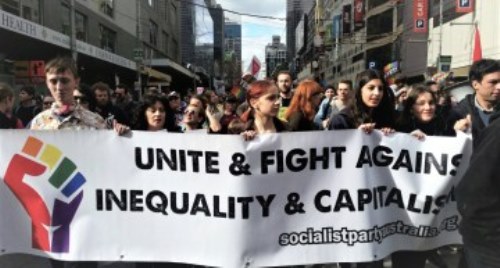
Australians are being asked in a plebescite held by the federal government: ‘Should the law be changed to allow same-sex couples to marry?’
In 2015, Australian prime minister Tony Abbott rejected calls to allow his MPs a free vote on the issue, insisting instead on a plebiscite (a compulsory national vote) on whether to change the law. Abbott was replaced as prime minister by Malcolm Turnbull, a declared supporter of marriage equality.
However Turnbull continued with the plebiscite policy. At the 2016 federal election, Turnbull’s Liberal-National Coalition only won with a narrow majority. The Turnbull government is now running the plebiscite on same-sex marriage before allowing the parliament to vote on marriage equality.
Kat Galea, from the Socialist Party (CWI Australia) reports on the Yes campaign and the issues involved.
Socialistworld.net
The campaign for marriage equality is now well underway. Surveys were sent out last month and should be returned by the end of October. The results will be announced on 15 November.
All indications are that the ‘yes’ campaign is going well. The Socialist Party’s ‘yes’ campaign stalls have been very well received, while polls are still showing big majorities in favour of marriage equality. According to a Guardian poll in mid-September, 83% of people said they were likely to vote, or had already voted.
In addition, there have been huge turnouts at marriage equality rallies across the country. In August and September tens of thousands of people demonstrated in Melbourne and Sydney. Undoubtedly these were the biggest LGBTIQ rights rallies that Australia has ever seen!
When the plebiscite was first announced last year, we were told by some of the more conservative leaders of the marriage equality campaign that it would unleash a carnival of reaction.
At the time, The Socialist disagreed, instead pointing to the possibility of people using the opportunity to openly express their support for equal rights. While there is no doubt been some examples of homophobia, the overwhelming mood has been one of support for LGBTIQ people.
Voting ‘yes’ is seen as so popular that even large companies like Woolworths, Coca Cola and Qantas have come out in support of the ‘yes’ campaign. Both the leaders of the two major parties are also pushing for a ‘yes’ vote. There is no way that these politicians would risk their seats, or that these companies would risk their profits, if this did not seem like a safe bet!
Weak ‘No’ campaign
This situation has made it quite difficult for the Australian Christian Lobby backed ‘no’ campaign to gain traction. The ‘no’ campaign has been extremely weak. For example, their TV ads have been widely discredited and mocked. They have had to resort to fearmongering and trying to convince those wavering that the sky will fall in if a ‘yes’ vote gets up.
The challenge for us now, due to the voluntary and postal nature of the vote, is to ensure that we get the biggest turnout possible. As well as increasing the turnout, we have the opportunity to win a section of the waverers to the ‘yes’ side. Even though the polls are pointing to a yes victory, this is not absolutely guaranteed. We need to be out campaigning until the last day in order to lock in every last vote.
A surprise ‘no’ vote would be a terrible setback for the LGBTIQ community. Despite the best hopes of some, the political reality is that Australian Prime Mininister Malcolm Turnbull is not going to allow a free vote in parliament on this issue. The internal divisions that exist within the governing Coalition mean that he would risk losing his fragile one seat majority in parliament. A ‘no’ vote would most likely mean that the issue would be delayed even further to the next election.
While we desperately need to win the ‘yes’ vote, it is actually only one part of the battle. We need to be ready to keep the campaign going after the survey. For example, the full details of the legislation have not been announced. This is something that the ‘no’ campaign is trying to use to their advantage. The bigger the ‘yes’, the less likely it will be that the legislation will include hidden surprises.
Under the guise of “religious freedom”, conservatives like former prime minister Tony Abbott are pushing for so-called “protections” for Catholic schools and other religious organisations. If allowed to proceed, these “protections” will just be discrimination by another name. We need to oppose hidden forms of discrimination in the marriage legislation and in all other laws.
Sadly, this type of discrimination already exists in some states and we should use the momentum produced by the ‘yes’ campaign to fight for it to be removed.
Winning marriage equality will obviously be a big victory. An important form of legal discrimination will have been removed, but it will not mean the end of inequality or homophobia. If we win, the enthusiasm, and the networks built should be used to tackle other forms of discrimination.
The Socialist Party wants to build a movement that puts young and working class LGBTIQ people to the fore. It should campaign on all the issues that LGBTIQ people face, but importantly it should link these issues to the need to fight for system change. This is the only way to achieve genuine liberation for LGBTIQ people.
Vote ‘yes’, but the fight doesn’t end with marriage equality!

Be the first to comment